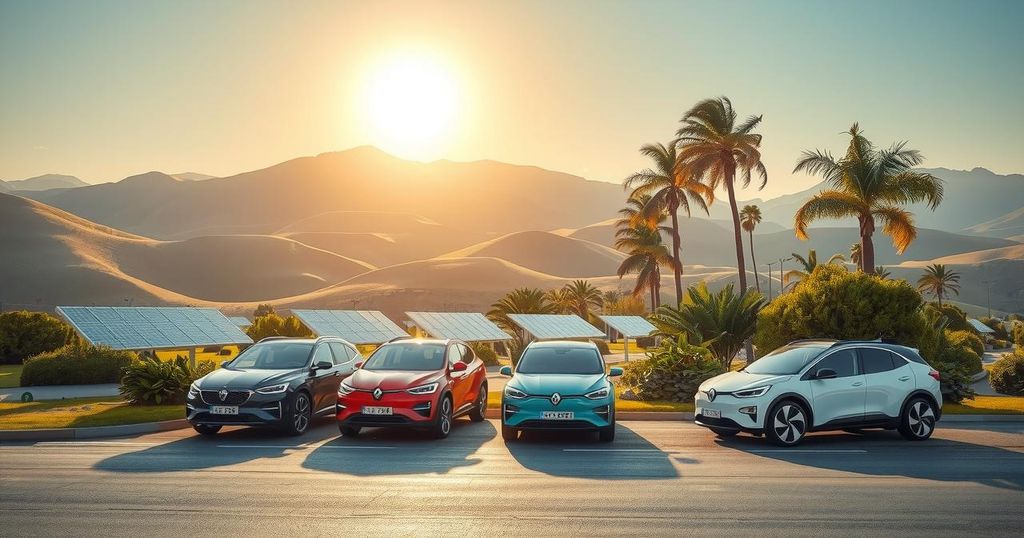South Africa’s Electric Dream: From Loadshedding to Leading the EV Revolution
South Africa has transformed from struggling with loadshedding to becoming a key player in the electric vehicle (EV) manufacturing sector. With a stable power supply and strong government initiatives, the country aims to capitalize on its solid automotive foundation, enhance industrialization, and bolster exports. The recent Electric Vehicles White Paper outlines strategies to promote EV production, while trade agreements strengthen its competitive edge in the growing e-mobility market.
A year ago, South Africa faced significant loadshedding challenges, making the concept of electric vehicles (EVs) seem unrealistic. Presently, however, the situation has transformed, with a stabilized power supply and proactive government initiatives positioning South Africa as a key player in the EV manufacturing sector. This represents more than just automotive development; it is a pivotal opportunity to enhance industrialization, stimulate exports, and spur economic growth.
South Africa’s automotive industry stands out in the continent, characterized by its maturity and the presence of leading global Original Equipment Manufacturers (OEMs) such as BMW, Toyota, and Nissan. The Automotive Production Development Programme (APDP) aims to enhance production levels and job opportunities, focusing on cultivating a competitive automotive industry capable of driving economic growth. Moreover, interest from Chinese manufacturers to access the broader African market accentuates South Africa’s potential in this arena.
The Department of Trade, Industry, and Competition (DTIC) released the Electric Vehicles White Paper in November 2023, acknowledging the seismic shift within the global automotive sector. The document highlights a major industrialization opportunity for South Africa, emphasizing the need to leverage existing manufacturing capabilities, logistical frameworks, and strategic trade agreements to bolster its position.
South Africa enjoys a network of beneficial trade agreements, including the Southern African Development Community (SADC), the SADC-EU Economic Partnership Agreement, the African Growth and Opportunity Act (AGOA) with the United States, and the African Continental Free Trade Area (AfCFTA). These frameworks prioritize the automotive sector, aiming to develop continental value chains and foster regional collaboration.
To stimulate the shift towards electric vehicles, the White Paper outlines ten critical actions, and the government is actively implementing these strategies. Key initiatives include enhancing investment levels, establishing a regional electric battery value chain, and temporarily reducing import duties on vehicle batteries produced domestically. Additionally, the recent Taxation Laws Amendment Bill introduces tax incentives to attract investment in EV production.
The legislation, particularly Section 12V, provides a 150% tax deduction for qualifying EV production assets until March 2036, creating a compelling incentive for investors. Proposed amendments to the APDP 2 Regulations will facilitate the transition from traditional combustion engines to electric vehicles through the introduction of the Production Rebate Certificate, which incentivizes local production.
The ‘rules of origin’ concept within trade agreements like the AfCFTA plays a critical role in determining eligibility for duty-free trade. Although the automotive rules are still being finalized, a common threshold of 40% applies in other regions. South Africa’s Special Economic Zones (SEZs), such as Coega and Tshwane, are strategically positioned to attract investments for electric vehicle manufacturing.
Regional cooperation is essential, as no single African country can fulfill all industrial roles. The AfCFTA and the African Automotive Manufacturers Association are endorsing a hub-and-spoke model, where South Africa would serve as a manufacturing hub, sourcing components from other African nations. Countries like Kenya, Ghana, Nigeria, Togo, and Ivory Coast are also advancing in e-mobility, specifically in public transport solutions.
For South Africa’s EV leadership to materialize, it must address infrastructure needs, ensure efficient logistics, and mitigate non-tariff barriers. Successfully navigating these challenges will enable South Africa not only to access traditional export markets but also to tap into increasing demand within the African continent, potentially unlocking vast economic growth and new industry potentials.
South Africa’s evolution from loadshedding to a leader in electric vehicle innovation exemplifies its resilience and holds promise for a sustainable and industrialized future across Africa.
South Africa’s transition from load-shedding to becoming a leader in electric vehicles highlights the nation’s adaptability and commitment to sustainable growth. Through governmental initiatives and collaboration with regional partners, South Africa is poised to leverage its manufacturing capacity, extensive trade agreements, and strategic infrastructure to drive economic development. This journey offers not only significant industrial opportunities but also the potential for positive change across the African continent.
Original Source: www.zawya.com




Post Comment